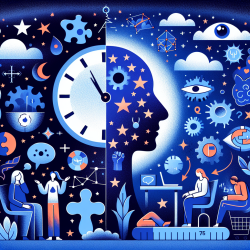Introduction
Melatonin, a neurohormone produced by the pineal gland, plays a crucial role in regulating circadian rhythms and has been linked to various neurodevelopmental processes. Recent research has explored its potential impact on Autism Spectrum Disorders (ASD), offering new perspectives for therapeutic interventions. This blog aims to provide practitioners with insights into the research findings and how they can be applied to improve outcomes for children with ASD.
Understanding Melatonin's Role in ASD
The research article "Advances in the Research of Melatonin in Autism Spectrum Disorders: Literature Review and New Perspectives" highlights several key findings regarding melatonin's role in ASD. Abnormal melatonin physiology has been associated with the pathophysiology and behavioral expression of ASD, particularly in relation to sleep-wake disturbances and social communication impairments.
Studies have shown that individuals with ASD often exhibit lower nocturnal melatonin production, which correlates with increased severity of social communication impairments. This relationship underscores the importance of melatonin in the ontogenetic establishment of circadian rhythms and its potential as a therapeutic target.
Implications for Practitioners
For practitioners working with children with ASD, these findings offer valuable insights into potential interventions. Here are some practical applications:
- Assessing Melatonin Levels: Consider evaluating melatonin levels in children with ASD, particularly those with significant sleep disturbances or social communication challenges. This can help identify potential deficits and guide intervention strategies.
- Melatonin Supplementation: Evidence suggests that melatonin supplementation may improve sleep patterns and potentially enhance social communication skills. Practitioners should consider this option for children with ASD, especially those with documented melatonin deficiencies.
- Integrating Chronotherapeutic Strategies: Combining melatonin supplementation with light therapy may enhance circadian rhythm regulation and improve overall outcomes. Practitioners should explore these integrative approaches to maximize therapeutic benefits.
Encouraging Further Research
While current research provides promising insights, further studies are needed to fully understand the mechanisms underlying melatonin's effects on ASD. Practitioners are encouraged to contribute to this growing body of knowledge by participating in or supporting research initiatives focused on melatonin and ASD.
Randomized clinical trials are particularly warranted to establish the therapeutic efficacy of melatonin for social communication impairments and stereotyped behaviors. Such research will help refine treatment protocols and improve outcomes for children with ASD.
Conclusion
Melatonin holds significant potential as a therapeutic agent for children with ASD, particularly in addressing sleep disturbances and enhancing social communication. By leveraging the insights from recent research, practitioners can develop more effective intervention strategies and contribute to the ongoing exploration of melatonin's role in ASD.
To read the original research paper, please follow this link: Advances in the Research of Melatonin in Autism Spectrum Disorders: Literature Review and New Perspectives.










